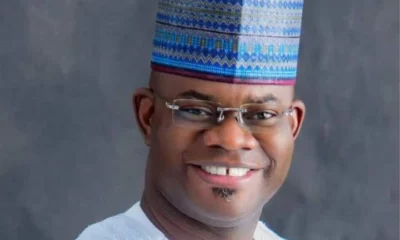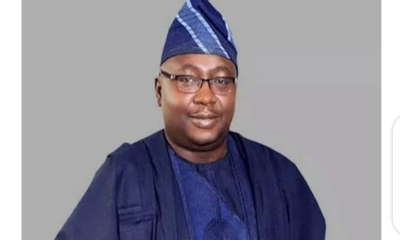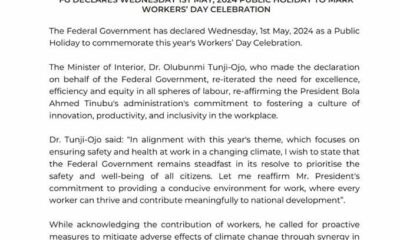News
Insurgency: Amnesty International laments over 1,800 Nigerians killed in six months


Amnesty International (AI) has said at least 1,813 people killed from January to date, across 17 states almost doubles the entire death toll of 2017.
Amnesty made this known in a statement on Wednesday, issued by its spokesman Isa Sanusi quoting the Nigeria Country Director, Osai Ojigho.
AI also blamed Nigerian authorities for failing to tame the killings, noting that the failure of security made attacks and reprisals frequent.
Ojigho said, “By failing to hold murderers to account, Nigerian authorities are encouraging impunity that is fueling rising insecurity across the country.”
He explained that, “independently verified estimated figures indicate that since January 2018 at least 1813 people have been murdered in 17 states, which is double the 894 people killed in 2017.”
“The death tolls reflect killings as a result of farmers-herders conflict, communal clashes, Boko Haram attacks and banditry,” he added.
He said, “We are gravely concerned about the rising spate of killings across the country, especially the communal clashes between farmers and herders and attacks by bandits across at least 17 states.”
“The authorities have a responsibility to protect lives and properties, but they are clearly not doing enough going by what is happening,” said Osai Ojigho.
He added that, “The latest incidence in Plateau state, where armed gunmen attacked 11 villages on 23 June for at least seven hours and killed at least 200 villagers without intervention from security forces should be investigated.”
He said, “That the violence in Plateau started after an attack, which was followed by reprisal attacks from Thursday 21 shows unacceptable security lapses.”
Amnesty said despite the deployment of security forces, including the military in over 30 states, the escalation of these attacks shows that whatever is being done by authorities is not working.
Ojigho said, “We hope that President Buhari’s commitment to bring those suspected to be criminally responsible for the killings in Plateau state to justice will break the impunity that has spread through the country.”
“In addition, government must answer these questions: who are these attackers, where do they come from, where do they go after attacks, who arms them, why is security forces’ response time very slow?” he added.
He said, “Amnesty International’s investigations show worrying details of how frequently the security forces failed to protect villagers.”
He said, “In all cases Amnesty International investigated, the attackers, usually arriving in their hundreds spend hours killing people and setting houses on fire and then disappeared without a trace.”
Ojigho said Amnesty International is also very concerned about the impact of these killings on farming, especially with the affected villages and farmlands deserted because people fear going back to their homes.
He said, “We are at the peak of farming season, and communities affected by this wave of violence are largely agrarian. But because of fear of attacks they have either been displaced or unable to cultivate their farms, therefore their major source of food and income threatened by the attacks.”
He said Amnesty International is calling on Nigerian authorities to address security lapses that make it easier for the killers to carry out attacks and disappear. (Daily Trust)
News
Nigerians Seek Woman Who Spoke Out Eloquently Against Fuel Scarcity In Viral 1994 TV Clip


April 30th 1994, 30 Years Ago, And Till Today Nothing Has Really Changed.
Netizens have gone in search of a beautiful and well-spoken woman who spoke out against fuel scarcity 30 Years Ago.
A user on X.com, Jackie, who identifies as #JWEZEE had shared the video yesterday with the caption, “On this day April 30 1994, same day same time, only difference 30years ago.
“Nigerians in long fuel queues lamenting, 30years later they are still lamenting. And In another 30years will still lament, why? Because patterns don’t lie.”
In the video, which has since gone viral, Nigerians were seen queuing to purchase fuel and lamenting their predicament as citizens waiting in long queues with their gallons to buy fuel.
The woman passionately addressed the unfairness of soldiers skipping queues to resell fuel, highlighting a longstanding problem.
She said in part, “You have the soldiers that come, they buy petrol, they put it in jerry cans they sell it right in front of these people, it’s ridiculous.
“They get the fuel themselves, why do they have to come here, they don’t join the queue, they just buy and they sell right in front of people, it’s ridiculous. Something has to happen.”
The 30-year-old video which recently surfaced coincides with the current fuel price hike across the country.
Here is the viral video from 30 years back.
Currently, the country is facing fuel scarcity and price hike, with fuel being sold at N900 per litre in some states. This has affected the price of goods in the nation.
News
FG Declares May 1st Public Holiday To Mark Workers’ Day


The Federal Government had declared Wednesday, May 1st, 2024, as a public holiday to mark this year’s Workers’ Day.
Nigeria’s Minister of Interior Olubunmi Tunji-Ojo made the declaration, according to the ministry’s Permanent Secretary Aishetu Ndayako.
“The Federal Government has declared Wednesday, 1st May 2024 as a Public Holiday to commemorate this year’s Workers’ Day Celebration,” Aishetu said in a statement on Tuesday, April 30.
“In alignment with this year’s theme, which focuses on ensuring safety and health at work in a changing climate, I wish to state that the Federal Government remains steadfast in its resolve to prioritise the safety and well-being of all citizens,” the minister said.
“Let me reaffirm Mr. President’s commitment to providing a conducive environment for work, where every worker can thrive and contribute meaningfully to national development”.
The minister, who acknowledged the contribution of workers, called for more measures to mitigate the adverse effects of climate change through synergy.
“The Minister also urged Nigerians to remain committed to the present administration’s Renewed Hope Agenda as he wishes workers a happy celebration,” the statement read.
News
“There Would Be total Blackout For Three Months If Electricity Tariff Hike Is Not Implemented ” – Minister Of Power Warns


The Minister of Power, Adebayo Adelabu, has warned that there would be a total blackout in the country in the next three months if the proposed electricity tariff hike is not implemented.
The minister gave the warning in Abuja when he appeared before the Senate Committee on Power at an investigative hearing over the recent electricity tariff hike by the Nigerian Electricity Regulatory Commission (NERC)on Monday, April 29.
In his words
“The entire sector will be grounded if we don’t increase the tariff. With what we have now in the next three months, the entire country will be in darkness if we don’t increase tariffs. The increment will catapult us to the next level. We are also Nigerians, we are also feeling the impact.”
He said the sum of $10 billion is needed yearly for the next ten years to revive the nation’s power sector and nip in the bud the challenges bedevilling it.
“For this sector to be revived, the government needs to spend nothing less than 10 billion dollars annually in the next 10 years.
“This is because of the infrastructure requirement for the stability of the sector. But the government cannot afford that. And so we must make this sector attractive to investors and to lenders. So, for us to attract investors and investment, we must make the sector attractive, and the only way it can be made attractive is that there must be commercial pricing.
“If the value is still at N66 and the government is not paying subsidy, the investors will not come. But now that we have increased the tariff for A Band, there are interests being shown by investors,” he said.
Adelabu said the inability of the government to pay outstanding N2.9 trillion subsidy was due to limited resources, hence the need to evolve measures to sustain the sector.
-



 Finance5 days ago
Finance5 days agoAISA Has Refunded The Fees Paid By Yahaya Bello To EFCC
-



 News5 days ago
News5 days agoKing Charles Reportedly “Really Unwell” And Funeral Plans Are Currently Being Reviewed
-



 Entertainment5 days ago
Entertainment5 days agoBig Congratulations To BBNaija Star, Miracle Igbokwe Who Graduated With Distinction From Embry-Riddle Aeronautical University In Florida USA
-



 Politics3 days ago
Politics3 days ago“Fuel Subsidy Removal Was A Necessary Action To Prevent Nigeria From Going Bankrupt” – President Tinubu
-



 News3 days ago
News3 days agoFuel Price Skyrockets To ₦1000 Per Litre In Some States As Scarcity Sets In
-



 News2 days ago
News2 days ago“There Would Be total Blackout For Three Months If Electricity Tariff Hike Is Not Implemented ” – Minister Of Power Warns
-



 News2 days ago
News2 days agoFG Declares May 1st Public Holiday To Mark Workers’ Day
-



 News19 hours ago
News19 hours agoNigerians Seek Woman Who Spoke Out Eloquently Against Fuel Scarcity In Viral 1994 TV Clip








